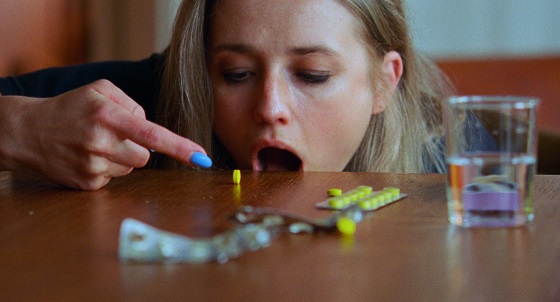

[Rating: Solid Rock Fist Up]
Now Playing in Limited Release
There’s a fine line between graffiti and art, between eccentricity and malevolence, and the danger lies not so much in those that don’t know the difference, but rather in those that do and just don’t care. Sick of Myself has some thoughts on the matter, and looks at the ways the bad actors among us manipulate the evolving social fabric of society, exploiting the best of humanity in service to the worst of it.
When the audience meets Norwegian couple Signe (Kristine Kujath Thorp) and Thomas (Eirik Saether), they’re discussing the logistics of a dine-and-dash scenario to secure a fancy bottle of wine. There’s a discussion about how it is a gag for a party they are attending later, yet the joke doesn’t really land, and Signe seems disappointed that the action leads to more attention for Thomas than her (even the waiter who chases after them runs past her without a second glance). An emerging artist whose theft of furniture for lazy post-modern sculptures is raising his profile, Thomas seems to be at the center of every social event, yet rather than being happy for his success, Signe endeavors to reclaim the spotlight from her beau at every opportunity.
This comes in the form of exaggerated stories, fake food allergies, and eventually the active consumption of off-market Russian pharmaceuticals to provoke a physical (and dangerous) reaction. This last Munchausenian act is the one that does the trick, and brings not just Thomas and their social circle to heel, but the larger world as well. As Signe revels in the raw, unfiltered attention her illness and disfigurement bring via fame and social media, the audience watches in horror as each new depravity raises her profile at the expense of her rapidly deteriorating physical shell.
This leads to some body horror that will be tough for the squeamish, but also to some darkly hilarious moments that emphasize the themes that writer/director Kristoffer Borgli is after with all of this. Signe is going through some grotesque shit, here, but this is a farce and not a tragedy. Hanlon’s Razor states that one should never attribute to malice that which is adequately explained by stupidity, yet there’s something to be said for the inverse of this.

It would be easy to attribute Signe’s behavior to idiocy, naivete, or even narcissism: but that would just be playing into the misguided woman’s hand. There are people who suffer from these afflictions, but that’s not what Borgli is talking about here, not by a long shot. Indeed, speaking of theoretical razors, Occam’s states that one should not search for complex solutions when the simplest answer usually suffices, which in this case implies that one should not mistake Signe’s malice for stupidity.
Indeed, she’s just an asshole, and the technology and social climate of the moment have synched into a harmonious groove that allows for Signe to explore and realize the worst possible version of herself. Perhaps she’s always been this way, and the moment at the beginning of the picture with the wine theft just represents this newest phase in her devolution, but the terrible person the audience meets at the beginning is more or less the same one at the end. Like a sadist who joins the Army or police force to legally hurt people, Signe finds the path of least resistance for her assholery throughout the course of Sick of Myself, maximizing her depravity.
And THAT’S the point. Social media might be shortening our attention span, robbing the next generation of their need for personal interactions, and commodifying our leisurely impulses, but it is also creating a venue for the worst among us to optimize their everyday fuckery. Which is to say that the rot has always been there: society is just maximizing its ability to feed, nourish, and encourage it to grow.

It’s an interesting thesis, and one that requires a capable lead to communicate its more challenging elements. Thorp is more than up for the challenge, however, and provides just the right amount of depth for Signe without too much sympathy to weigh down the bigger considerations. When she’s got Signe’s gears turning, thinking about the next manipulation or bluff, it is both subtle and striking, and evokes a palpable, visual tension necessary for these moments.
Yet these schemes aren’t the work of genius or inspiration, which again, is the point. Signe is a profoundly broken person grasping at any opportunity for recognition, and the process of watching her work in Sick of Myself is like a montage of outfit changes until she finds one that fits. Thorp communicates this desperation with dizzying precision and sets the tone for a supporting cast that is likewise nailing each of their scenes.
Brisk and tidy at just 97 minutes, the film does struggle with its pacing in the first half, sometimes straining to find a rhythm between scene transitions. The lack of any sympathetic characters also makes for a tough sit at times, for Thomas, their friends, and even Signe’s mother are all different degrees of trash. Sour at times as a result, this also leads to more than a few funny moments (Signe’s attempt to engage in holistic therapy a standout amongst them).
A dark comedy bespoke-crafted for the 2020s, Sick of Myself explores the depths of depravity possible in a click and algorithm-defined decade. Some will examine this as a text on narcissism, or even psychopathy, but as psychiatrist Dorothy Otnow Lewis once remarked, “I always tell my graduate students that if they can find me a real, true psychopath, I’ll buy them dinner.” Could Signe be a narcissist, or a psychopath? Maybe…but it’s more likely she’s just a very successful asshole. Sick of Myself contends that the ones like Signe have always been there, but that the 2020s are giving them the room to fully spread their wings.





Comments on this entry are closed.